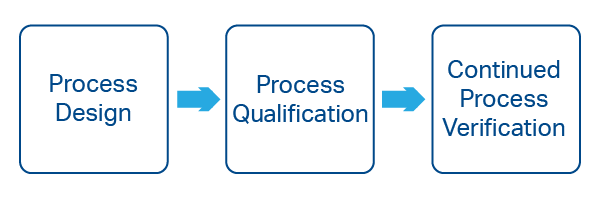Discovering ways to develop great-tasting foods and beverages can be an invigorating and gratifying process. However, once discovery has been achieved, you must verify that your production process renders foods or beverages that are safe for consumption.
For many food manufacturers, this entails not only meeting minimum regulatory requirements but also establishing processes that meet even higher internal or customer-driven standards. This blog focuses on process validation and why it’s essential to your food establishment.
What Is Process Validation?
What is process validation for foods and beverages?
Process validation is a means of providing evidence that proper food-processing methods are implemented from production to distribution.
Validating a process requires collecting documentation and data, whether from scientific literature, internal studies, or regulatory resources, that…
- Describe the measures you take to safely produce a product.
- Identify potential hazards and concerns.
- Enumerate the tools and metrics to monitor and control these hazards and concerns.
- Prove your ability to control these food-safety hazards through preventive means (validation step).
- Confirm your ability to produce high-quality products consistently (verification step).
Steps in Process Validation and Verification
Once you’ve drafted the production procedures and processing parameters, there are two steps to take to ensure you’re up to acceptable standards: validation and verification.
- Process validation is the enterprise of generating data to support the efficacy of your process in achieving its intended effect.
- Process verification is the enterprise of continuously monitoring the critical parameters for the purpose of confirming that they have been implemented as designed and validated via the process validation.

Process Validation Examples
It helps to visualize an example when learning a new concept, so let’s look at a process validation example.
Imagine you produce ready-to-eat almonds for retail sale. Regulations require you to implement a treatment process that results in a minimum 4-log reduction in Salmonella bacteria prior to being shipped. You can achieve this through a variety of processes, including oil roasting, blanching, or steaming. Whichever process you choose, you must validate through a process validation study that it achieves the required Salmonella reduction.
A process validation study involves inoculating almonds with a surrogate organism, running them through your treatment process, and then verifying the required outcome.
Given the complexity, it’s best to hire a testing organization to undertake a process validation study. For some products, using a certified organization is required. FSNS Lab+ conducts process validation studies for several industries.
Why You Must Demonstrate the Efficacy of a Kill Step
While successful completion of a process validation is an important milestone on the road to compliance, the journey continues past the point of generating data to demonstrating the efficacy of a kill step in the inactivation of pertinent pathogens.
Verification is a continuous process by which data are collected and analyzed throughout production; it is a critical component in the larger feedback loop of the food-quality and safety program.
These data may prompt calls for process alterations, both minor and major, and on some occasions revisiting a process validation if aspects of a production process change significantly, such as the ingredients, packaging configuration, processing parameters and/or food-safety objectives.
What are the Regulatory Requirements for Process Validation of Food Products?
The Food Safety Modernization Act (FSMA) mandates a regular review of your food safety plan, including process validations, every three years (21 CFR 117.170). This review may also prompt a re-analysis of safety requirements, which in turn can lead to a new process-validation procedure that replaces the initial validation.
FSMA, the most comprehensive U.S. food-safety-law reform in the modern age, was enacted to shift the focus from managing food-safety failures to preventing foodborne illnesses. Moreover, it mandated that the FDA ensure compliance among various food-production establishments and across all phases of the food-supply chain.
With this, businesses producing FDA-regulated food, including co-manufacturers, producers, processors, packers, and re-packers, are required to develop and verify food-safety plans and conduct food-safety tests, which may then require process validation.
Specific regulatory requirements vary depending on the industry. Contact EAS Consulting Group, our regulatory consulting department under the Certified Group banner, for help deciphering your regulatory requirements.
What if I Fail to Comply with FSMA?
There are consequences for failing to comply with FSMA regulations.
For example, if contamination is identified in a food-production facility, potentially affected products can be detained, a food recall issued, and/or fines levied. In worst-case scenarios, facility production can be suspended until sufficient evidence has been generated to demonstrate that control has been reestablished.
Besides fulfilling the necessary legal requirements, diligently undergoing process validation makes sense for a business. A well-designed process validation and robust verification program increase confidence that the process will reliably produce product in a manner that mitigates hazards that could endanger consumers, brand reputation, the company, and its employees.
How Do I Overcome the Regulatory Challenges of FSMA?
It can be challenging to keep up with regulatory and industry requirements. Most establishments are familiar with FSMA and HACCP guidelines, but many need additional guidance to upgrade their Food Safety Management System.
Given the relatively infrequent need to conduct full-scale process validations, the technical nuance associated with validation study design and the laboratory facilities required for execution, most companies need external support when embarking on process validation activities.
Why Enlist a Testing and Consulting Company to Help?
Selecting a reputable and accredited food-safety testing and consulting firm is crucial for a successful validation workflow. Here are the key benefits an experienced process-validation expert can provide:
- Provides value from initial project management through to completion.
- Offers expertise in designing studies that are both cost-effective and data-rich.
- Provides assistance and oversight during the data collection phase.
- Generates an interpretative final report, simplifying what can be a complex and resource-intensive process.
With all of that in mind, consider enlisting the expertise of FSNS Lab+ for your next process validation. With a network of ISO 17025 accredited laboratories, FSNS works with our Certified Laboratories, our fellow Certified Group company, to provide comprehensive microbiological projects and shelf-life testing. We also offer auditing and consulting services to ensure your food-safety management systems meet industry standards.
Download our process validation checklist so you know what to expect when planning for a process validation.




